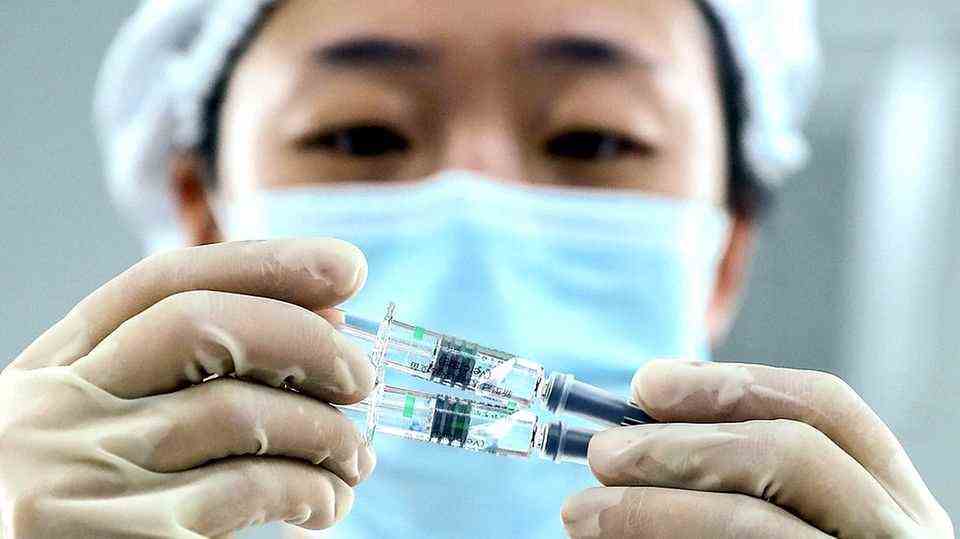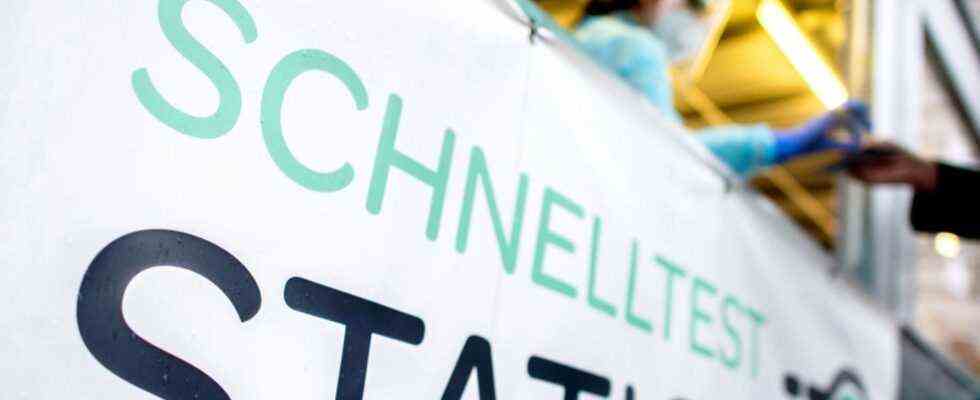In response to the fourth wave, politicians have tightened the corona measures. Anyone who wants to take part in public life can hardly avoid regular tests – not even if they are vaccinated. But appointments are rare. Why is that?
The fourth wave spills over Germany. Politicians reacted, albeit late, by tightening the measures. In all federal states, 3G and sometimes even 2G plus restrictions apply to certain areas of life.
“Everyone can and should test themselves regularly,” said Chancellor Olaf Scholz recently in his speech in the ProSieben show “Joko and Klaas 15 minutes live: We have to talk about Corona”. Better said than done. Because in many places the following applies: Anyone who wants to be tested needs plenty of patience – and often a high level of frustration.
This was clearly visible on the weekend on Germany’s most famous party mile, the Hamburg Reeperbahn. For the first time, the rule was: whether vaccinated or not – those who do not get tested can dance outside. However, the quick test appointments were already fully booked in advance in many quarters of the Hanseatic city – sometimes for days. Why is that? Of the star spoke to two providers of corona test stations.
Paid tests: “Demand has fallen by 50 to 75 percent”
“It was very easy in Hamburg in the spring. A contract was signed with the city: We only had to meet certain requirements (for example employee training and a hygiene concept) and were then allowed to open a station at a location of our choice,” remembers Axel Strehlitz . The organizer and club operator on St. Pauli operates numerous test stations in Hamburg with “Corona Freepass”. Then it got more complicated. “You received an ‘order’, according to which you got the permission from the health department to carry out the free citizen tests. With this order you have to register with the Association of Statutory Health Insurance Physicians as a test station and later handle the billing.”
From October 11th, free tests were over. Just in time for this, the city of Hamburg canceled the commissioning of private providers, says Strehlitz. The Freepass team only received a letter in which it said: “Thank you for your commitment.” It is no wonder that interest in testing sank rapidly: “Demand has fallen by 50 to 75 percent”, says Thomas Fasshauer, co-partner of the company “Stay Safe”, which currently operates more than 120 test stations nationwide. In other parts of the country there was at least the option of “suspending” the commission. It was usually not worth it.
“Come Impf And Find Out”: 150 brands change their slogans for vaccination campaign – these are the 20 best
20 images
Supply cannot meet demand
One month and one wave of infections later, the tests are again free of charge. “The demand doubled overnight, now tenfold,” says test station operator Strehlitz. No wonder in view of the strict measures, also in Hamburg: 3G in local public transport, obligation to provide evidence for unvaccinated employees, 2G-plus in clubs or, as the saying goes, “dancing pleasure”. If you only want to test yourself to “be on the safe side”, you could switch to a self-test. You might think so. Buying a self-test is increasingly turning into a scavenger hunt: the prices have risen, the tests are sold out almost everywhere, like the one star reported.
With the exploding demand, however, the supply by no means increased: “At the top we – together with cooperation partners – operated more than 50 test stations. Now there are still around 20,” says Strehlitz. Before the tests became chargeable in mid-October, several test counters were available on the Spielbudenplatz on St. Pauli. Now only one is open. Where previously Freepass customers could conveniently and spontaneously arrange an appointment on the website, it now usually says: “Unfortunately, all appointments at this station are already taken today”.
The test demand in the Hanseatic city has increased. Anja Segert, press spokeswoman for the Hamburg social welfare authority, does not want to confirm that it is generally difficult to find an appointment in Hamburg. It depends on where you are looking for an appointment in Hamburg. “Since billing options are available again in the course of the financing by the federal government, we assume that additional offers will be opened if the demand should exceed the supply,” the social authority continues.
Providers could not respond to onslaught
When the Hamburg Senate announced on November 30th that it would tighten the corona measures, Strehlitz was not informed in advance. “Nobody knows beforehand what the Senate will decide,” he says. As a provider, he was therefore by no means able to prepare for the onslaught.
“You have been notified,” says Segert from the Hamburg social welfare authority. However, the authority itself was informed at short notice by the Federal Ministry of Health. “When we had this information, we passed it on accordingly,” said the spokeswoman. But one would have “learned a lot of things through the media”.
In other federal states, too, according to “Stay Safe” shareholder Fasshauer, the providers could not have responded to the massive demand. Of course, the company wants to ramp up the test capacities as quickly as possible. “We open ten new test centers all over Germany every week,” he says. But that would be much faster if it weren’t for the German bureaucracy. “My feeling is that the majority of the health authorities are overwhelmed with the situation,” says Fassbauer. Processing times there sometimes took weeks. Then again, formalities often fail: too few windows, the wrong ventilation system. According to Fasshauer, the regulations differ from state to state, from health department to health department.

279 inquiries from private providers – in Hamburg-Mitte alone
In Hamburg, on the other hand, the Senate wants “as few private providers as possible,” believes the organizer Strehlitz. “In Hamburg our centers now run a laboratory whose work we support,” after all, the necessary assignment has not yet been reissued. In any case, the Hamburg social authority is no longer responsible for this, but the individual districts themselves. “Hamburg-Mitte, I was told, has ‘no need’ for private providers”. There is also the Reeperbahn party mile. At the request of the star the district office of Hamburg-Mitte stated that there are currently 279 inquiries from private test providers. These would be checked. It would “promptly provide further test options,” it says on the part of the district office. However, one wants to concentrate first on the expansion of test capacities in the “closer living environment” – that makes more sense “from an infection logic” point of view.
“The medical providers, including laboratories, medical practices, pharmacies and also aid organizations, can open further offers without separate commissioning by the authorities”, emphasizes Segert from the Hamburg social authority. However, with the introduction of the 2G plus rule for clubs, the demand for tests in the late evening hours has also increased. “I don’t know any doctor or pharmacy that offers tests at night,” says Strehlitz. A catering company on Sankt Pauli, so reports the NDR, has opened its own test station on the Sin Mile. The nocturnal corona check costs twelve euros here, after all, the station is not officially commissioned by the health department. The “Stay Safe” test centers would also like to extend their opening times, says partner Fasshauer. But it is not so easy to find staff.
According to the Hamburg social authority, 113 test centers are currently open in the Hanseatic city. That is “already 42 more than at the end of the free tests on October 10th”. But anyone who is out and about in Hamburg – and in many other cities – does not notice much of it.

